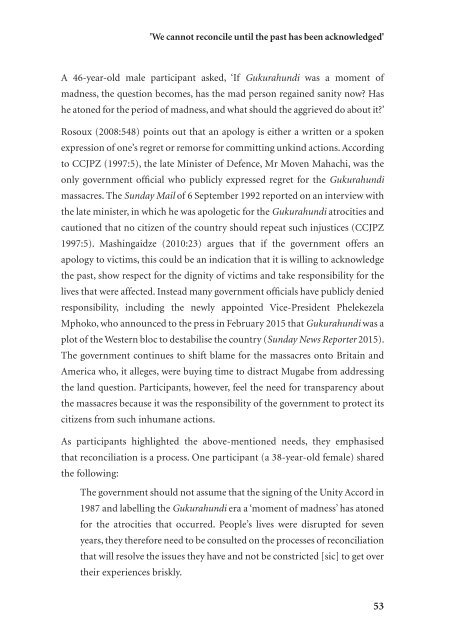ACCORD-ajcr-2015-1
ACCORD-ajcr-2015-1
ACCORD-ajcr-2015-1
- No tags were found...
Create successful ePaper yourself
Turn your PDF publications into a flip-book with our unique Google optimized e-Paper software.
'We cannot reconcile until the past has been acknowledged'<br />
A 46-year-old male participant asked, ‘If Gukurahundi was a moment of<br />
madness, the question becomes, has the mad person regained sanity now? Has<br />
he atoned for the period of madness, and what should the aggrieved do about it?’<br />
Rosoux (2008:548) points out that an apology is either a written or a spoken<br />
expression of one’s regret or remorse for committing unkind actions. According<br />
to CCJPZ (1997:5), the late Minister of Defence, Mr Moven Mahachi, was the<br />
only government official who publicly expressed regret for the Gukurahundi<br />
massacres. The Sunday Mail of 6 September 1992 reported on an interview with<br />
the late minister, in which he was apologetic for the Gukurahundi atrocities and<br />
cautioned that no citizen of the country should repeat such injustices (CCJPZ<br />
1997:5). Mashingaidze (2010:23) argues that if the government offers an<br />
apology to victims, this could be an indication that it is willing to acknowledge<br />
the past, show respect for the dignity of victims and take responsibility for the<br />
lives that were affected. Instead many government officials have publicly denied<br />
responsibility, including the newly appointed Vice-President Phelekezela<br />
Mphoko, who announced to the press in February <strong>2015</strong> that Gukurahundi was a<br />
plot of the Western bloc to destabilise the country (Sunday News Reporter <strong>2015</strong>).<br />
The government continues to shift blame for the massacres onto Britain and<br />
America who, it alleges, were buying time to distract Mugabe from addressing<br />
the land question. Participants, however, feel the need for transparency about<br />
the massacres because it was the responsibility of the government to protect its<br />
citizens from such inhumane actions.<br />
As participants highlighted the above-mentioned needs, they emphasised<br />
that reconciliation is a process. One participant (a 38-year-old female) shared<br />
the following:<br />
The government should not assume that the signing of the Unity Accord in<br />
1987 and labelling the Gukurahundi era a ‘moment of madness’ has atoned<br />
for the atrocities that occurred. People’s lives were disrupted for seven<br />
years, they therefore need to be consulted on the processes of reconciliation<br />
that will resolve the issues they have and not be constricted [sic] to get over<br />
their experiences briskly.<br />
53


